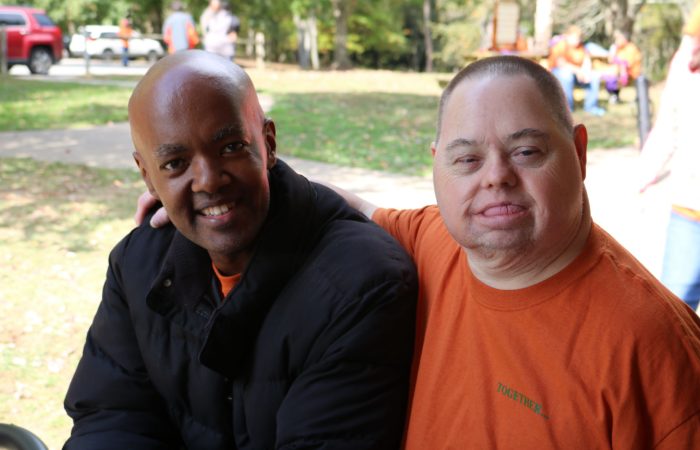Join us on Facebook. You’ll find the latest news, photos and videos.
The theory of Social Role Valorization (SRV) and its predecessor idea, the Principle of Normalization, was first brought to North America and developed in the early 1970s by Dr. Wolf Wolfensberger. At the time, inhuman conditions prevailed in North American institutions, where many thousands of people with disability were segregated, congregated, abused, and imprisoned. Normalization, and later Social Role Valorization, informed and impassioned a generation of architects of the community system as they envisioned a community in which people with disability could experience freedom, dignity, and the opportunity to experience ”the good things in life.”
SRV is a social theory that examines and helps us understand the process of social devaluation. How do people come to be at the bottom of the social ladder, and what are the predictable “bad things” likely to come their way once they lose value within the society? These “bad things” have been descriptively called the “wounds” of social devaluation and are inflicted on devalued people relentlessly, systematically, and often unconsciously. They include such experiences as being profoundly rejected, being thrust into negatives roles such as “eternal child” or “menace” or “object of pity,” being stigmatized by the attachment of devastating imagery, being distanced and segregated from society, and many other hurtful and damaging experiences. Because this process of wounding is at odds with the professed social and religious values of our society, there is very low awareness and consciousness about it, and it is often even perpetrated by human services intended to help people.
Social Role Valorization then poses the question, “If we want good things to happen in the lives of marginalized people, what can be done?” SRV states that the good things in life that we all strive to have, such as freely-given relationships, belonging, a good reputation, contribution, and personal growth, tend to come to people who have many positively valued social roles, such as neighbor, student, citizen, family member, etc. If we can assist people to move into valued roles, we increase the likelihood that people will have access to these good things. The framework of Social Role Valorization is taught through ten themes:
Today, Social Role Valorization remains highly relevant and useful within all fields working to make things better for marginalized and oppressed people. Understanding the societal forces of devaluation and how to effectively work toward a full, rich meaningful life alongside people equips us to work for real change in the world.
Explore Social Role Valorization through Keystone Institute’s Events and Workshops
Keystone Human Services has cultivated SRV leaders to continue to build a community of practice and assist others to learn about and use Social Role Valorization.
Person Directed Planning is an exciting, solution-seeking planning process that unites people around a person, family, team, or issue to help create a vision of a desirable day and future. The process develops concrete steps to move closer to that vision while building connections within the community.
A meaningful daily life and future do not need to be predetermined by current circumstances. Instead, people can and should direct their lives, defend their rights, and be included in all society has to offer.
Powerful Tools for Change
The Person Directed Planning Process uses a variety of vibrant, interactive tools and skilled facilitation. Each tool has unique distinctions, and a skilled facilitator can guide a person, family, or group in deciding which tool would assist them in their planning to develop meaningful futures and valued social roles for people and organizations.
Examples:
For more information, email Pam Seetoo at [email protected].
Implementation Coaching Projects focus on strengthening KHS’s common values within the workforce, assisting teams to implement good supports, and sharing the successes and challenges of our work.
We offer assistance and coaching to specific teams and work groups to connect the people they serve with typical people in valued roles in their local community. Keystone Institute faculty offers mentoring and teaching support in community mapping, person-directed methods, and Social Role Valorization in individualized and integrated ways.
Projects are designed in tandem with regional and area leadership. Work teams interested in pursuing implementation projects should discuss them with their leadership and contact Pamela Seetoo at [email protected].
Keystone Institute has an extensive library of books, videos, and periodicals on topics related to disability, community, Social Role Valorization, and Person-Directed Planning, including some hard-to-find titles, many historically important authors, and popular films. We are constantly acquiring new and interesting materials.
We would love to help connect you with the resources you need. Faculty can make recommendations if you have a specific area you are researching. You can borrow items by visiting our office at 3700 Vartan Way, Harrisburg, PA 17110. We also loan books through the mail. Please contact us to use the library.

Since Keystone Human Services’ inception in 1972, powerful and enduring ideas have shaped our commitment to helping vulnerable and marginalized people to take their rightful place in our society and have access to the “good things” of life—things like belonging, acceptance, freely-given relationships, true home, valued work, and an ability to develop and contribute their gifts to the world.
The concepts and principles of Social Role Valorization, social and economic justice, individual autonomy and freedom, natural supports, highly individualized and flexible support, and the developmental model have been enduring concepts interwoven into the fabric of our organization.

Join us on Facebook. You’ll find the latest news, photos and videos.
Join us on X (formerly Twitter). You’ll find the latest news, photos and videos.
Join us on LinkedIn. You’ll find the latest news, photos and videos.
Join us on YouTube. You’ll find the latest news, photos and videos.
Join us on Instagram. You’ll find the latest news, photos and videos.